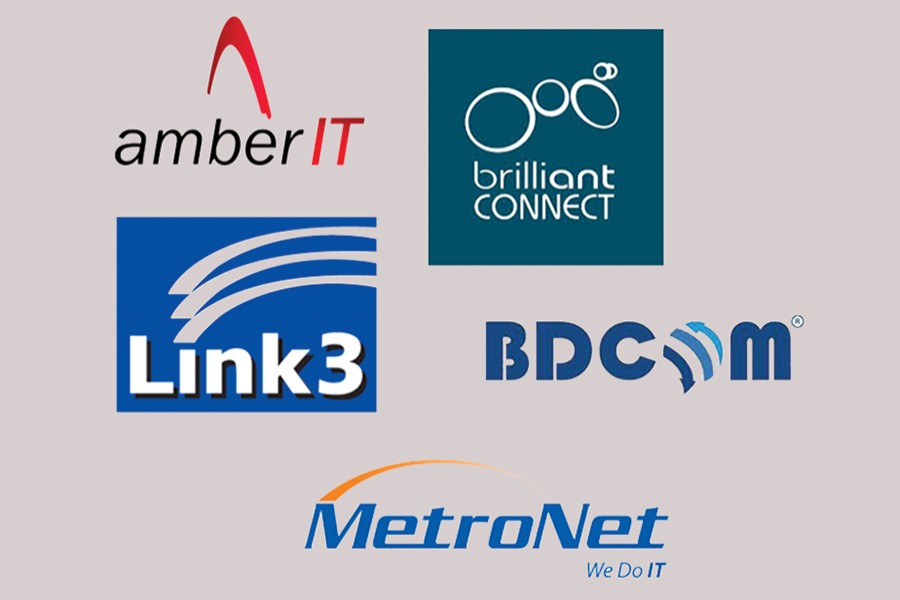Home-grown apps for voice, video call and instant messaging services are making inroads into the market, posing a threat to telecom operators' dominance over the same, industry insiders said.
Seven internet protocol telephony service providers (IPTSPs) recently sought licence to launch mobile phone application-based call services, sources in the regulator confirmed.
Last year, the government granted licences to five IPTSPs to earn money through delivering app-based services.
Brilliant Connect was one of the apps that drew a lot of attention in the market, with calls growing many times in just six months after its launch.
However, telecom companies (telcos) opposed the new entry into this area of call services as they were worried about a dent in their revenue.
According to the Bangladesh Telecommunication Regulatory Commission (BTRC), telcos formally made an appeal to the regulator against such licensing.
Instant messaging, video, audio and other services with an open internet connection can be delivered without any infrastructure investment and other requirements on the part of the provider, they argued.
On the other hand, a telecom operator requires massive investment.
"Such opposition is not rational. Mobile operators were awarded licences to run 3G, 4G and GSM," said Zakaria Swapan, a well-known information technologist.
He said they cannot oppose other kinds of voice or video calls as they cannot oppose calls on the landline.
They are different mediums and it is a natural transformation of technology, Mr Swapan cited.
"Even IPTSPs have to run business with data and they have to buy data from telecoms. So, it's entirely a win-win situation for both of them."
Association of Mobile Telecom Operators of Bangladesh secretary Brig Gen (retd) SM Farhad said they did not actually oppose the BTRC decision to grant licences to IPTSPs.
"We only placed some observations on the decision (regarding the launching of the apps)," he told the FE.
Mr Farhad said mobile operators have invested billions of dollars to buy radio frequency and build their networks to provide voice and data services to customers.
Now being permitted to have apps with calling-out facility, he said, these IPTSPs will render such services without paying for spectrum.
"Additionally, MNOs have to spend billions of taka for biometric registration and absorb any fine related to non-compliance, but others don't have to," he observed.
"All we are seeking is the same rule for the same service. MNOs are also licensees of BTRC and expect fair treatment to its all licensees."
Intercloud Ltd, a leading IPTSP, launched its first service with its app 'Brilliant' last year.
The mobile app handled around 30 million minutes of calls this May.
The figure was 1.8 million minutes in the month of its launch in July last, according to the BTRC data.
As of December, the app was downloaded some 2.0 million times while the number of unique users crossed 0.3 million, said a senior official of the venture.
Having exceeded the limit, Intercloud is currently working to expand the app's capacity, he mentioned.
The BTRC recently decided to allow any nationwide IPTSP to launch this app-based call service amid concerns over its misuse for international call termination.
The volume of incoming international calls through the legal channel here plunged in three and a half years amid the growing number of over-the-top and illegal voice-over-internet-protocol calls.
In May 2015, the volume of such calls recorded the highest 38.32 billion minutes with a daily average of 123 million minutes.
The call volume, however, dropped to around 10.2 billion minutes last November with a daily average of 34 million minutes.
An IPTSP requires depositing Tk 50 million in a bank as security money before getting a licence.
It also cannot operate incoming or outgoing international calls as per the BTRC policy.
The policy stipulates that an operator will have to ensure that none can misuse the technology by depriving the government of revenue while generating local or international calls.
An operator will also need to take prior approval from the commission to offer value-added services.
In case of non-compliance, the BTRC will penalise an entity by taking away either the full amount or a portion, depending on the degree of the violation.
According to market insiders, the industry would get a huge boost after all the products are launched as the applications would be interoperable.
After Brilliant's success, the BTRC in December 2018 approved Amber IT Ltd, BDCOM Online Ltd, MetroNet Bangladesh and Link3 Technology Ltd to run the service.
The four are expected to hit the market within the next couple of weeks.
"We'll hit the market very soon with our services on the app 'Kotha'," BDCOM Online managing director FM Golam Faruk Alamgir told the FE.
However, he does not think opposition from telecom operators would be a big problem.
"The use of data of telecom services will increase through our services. It's a win-win situation for both," he continued.
But poor quality and expensive rate of internet remain a challenge for fast expansion of the use of such apps.
Mr Swapan said app-based calls are already a reality in many developed countries, but poor quality and expensive data obstructed its expansion in Bangladesh.
"This is the reason that apps are not doing well in Bangladesh," he told the FE.
"Thousands of apps are doing well in India. If TV is switched on, most advertisements that appear are of app services."
"Only a handful of apps are doing well here only due to lack of quality data," Mr Swapan commented.
There are a total of 31 IPTSP licensees in the market.


